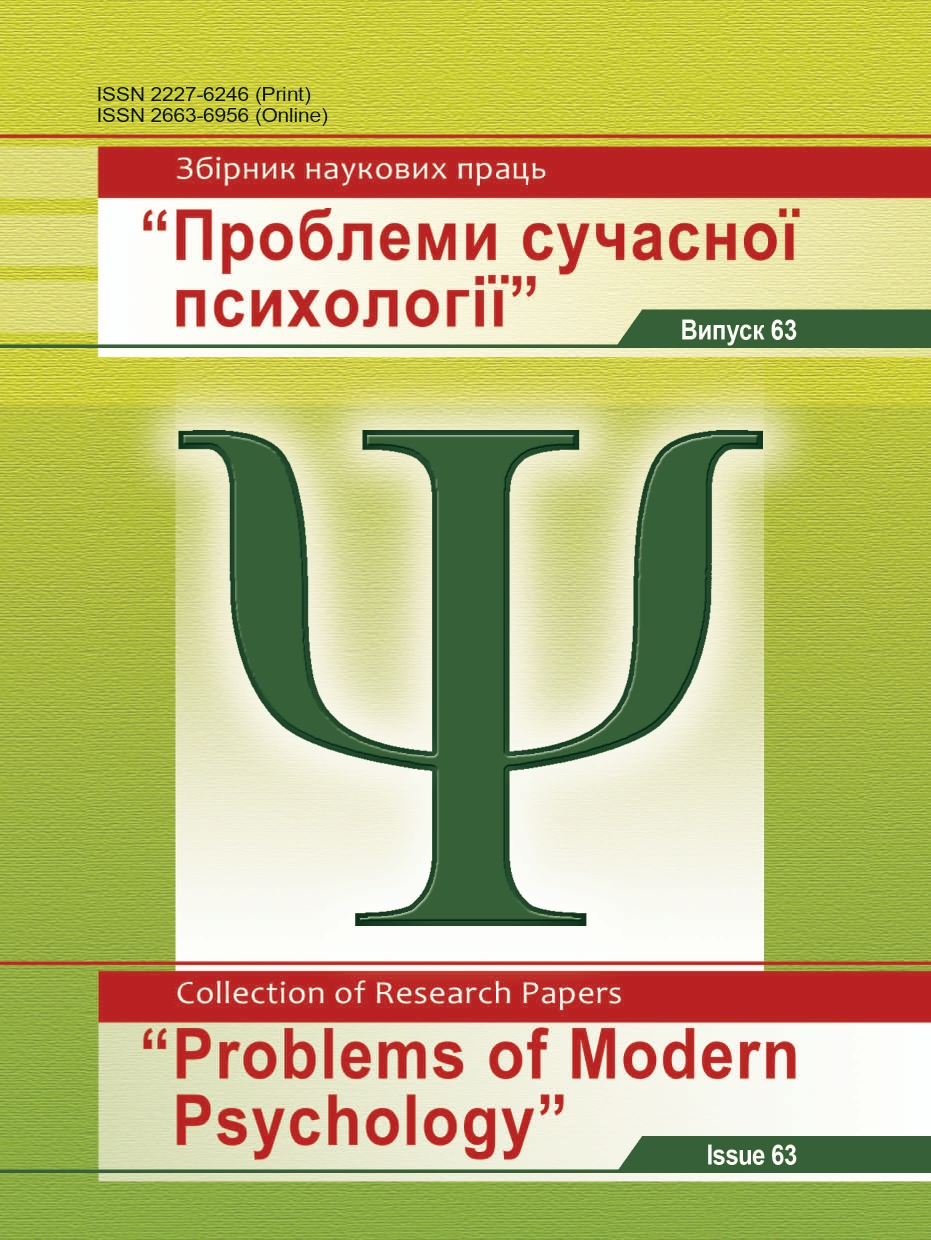Psychological Ways of Forming a Teenager as a Subject of Cognitive Activity
DOI:
https://doi.org/10.32626/2227-6246.2024-63.308-329Keywords:
a Subject, Cognitive Activity, valuable experience, the experience of reflection, the experience of habitual activation, operational experience, the experience of cooperationAbstract
The aim of our research is to show psychological ways of forming a teenager as a subject of cognitive activity by providing a confirmatory experiment at secondary schools.
Methods of the research. The following theoretical methods of the research were used to solve the tasks formulated in the article: a categorical method, structural and functional methods, the methods of the analysis, systematization, modeling, generalization. The experimental method was the method of organizing empirical research.
The results of the research. It was shown, that we connect the effective solution of the problem of Subject activity with the solution of the question of what it is the source of this activity. We’d like to note that the external Cognitive Activity of the person depends on the internal Cognitive Activity not only in the sense that any external influences are realized only through the internal characteristics, but the internal ones also have its own direct source of the activity and development. Analyzing Pre-Subjective Cognitive Activity, including genotypic influences, in which the biological and social prerequisites of the development are suppressed. We believe that it is necessary to take into account spontaneity in the development of the Subject of Cognitive Activity. We introduce the concept of a center of Subject’s Activity, the formation of which is manifested in a gradual change in the relationships between External and Internal types of Cognitive Activity: from the prevailing orientation of External through Internal Content to the increasing dominance of the tendency Internal through External Senses.
Conclusions. Taking into account the opportunities given by the nature and acquired them into the process of education and upbringing, as well as the demands of the Ukrainian society, we single out the following structure of the Subject of Cognitive Activity. The content of the Subject of Cognitive Activity is a hierarchy of goals, one way or another presented in the mind of a person and the formed subjective experience of a person. A form of Subjectivity is conscious self-regulation of human activity and behavior. The implementation of the Subject of Cognitive Activity is determined by the interaction of formed self-regulation skills and components of subjective experience. We single out the following components of Subject’s experience: 1) valuable experience (related to the formation of interests, ethical norms, ideals, beliefs); 2) the experience of reflection; 3) the experience of habitual activation; 4) operational experience; 5) the experience of cooperation.
Downloads
Published
How to Cite
Issue
Section
License
Copyright (c) 2024 Ternovyk Nataliia, Simko Alla

This work is licensed under a Creative Commons Attribution-NonCommercial 4.0 International License.
Copyright
The Editorial Board has the full right to publish original scientific papers containing results of theoretical and experimental research works which are not currently subject to review for publication in other scientific editions. The Author shall transfer to the editorial board of the Collection the right to spread the electronic version of the paper, as well as the electronic version of the paper translated into English (for papers originally submitted in Ukrainian and Russian) by all kinds of electronic means (placement at the official website of the Collection, electronic databases, repositories etc).
The Author of an article reserves the right to use materials of the paper, without approval with the editorial board and the founders of this Collection: a) partially or fully, for educational purposes; b) for writing own dissertation papers; c) for preparation of abstracts, conference reports and presentations.
The Author of an article can place electronic copies of the paper (including the final electronic version downloaded from the official website of the Collection) at:
- personal web resources of all Authors (websites, webpages, blogs etc.);
- web resources of the institutions where the Authors are employed (including electronic institutional repositories);
- non-profit public access web resources (for example, arXiv.org).
But in all cases, it is obligatory to have a bibliographic reference to the paper, or a hyperlink to its electronic copy placed at the official website of this Collection.






